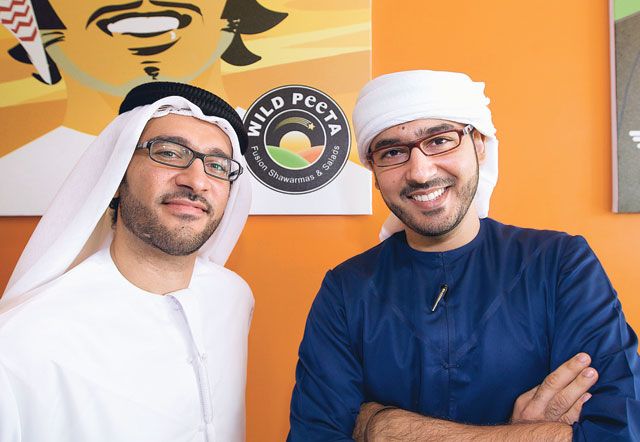Dubai: Having no real advertising or marketing budget would seem to most a massive disadvantage when starting a restaurant in Dubai.
Wild Peeta, however, who opened their Emirate shawarma-based restaurant last Wednesday, believe they have an edge global brands cannot touch, as online relationships with customers and followers have brought with them a fan base of over 2,000 individuals.
After struggling for years to persuade the city's malls to give them a spot where they would catch passing shoppers, three years ago they gave up and changed their business model.
Being located on the street would not bring hungry residents, so they decided to make the company 70 per cent delivery-oriented. This meant heavy advertising would be required, and without the budget for that, they resorted to Twitter, Facebook and MySpace.
Click here to follow Gulf News on Twitter
Click here to follow Wild Peeta on Twitter
"We knew we didn't have the budget of the corporations so we knew we had to go online," said Mohammad Parham Al Awadi, who owns and runs Wild Peeta with his brother Peyman.
At the end of last year, they started a group on the social networking site Facebook, and earlier this year branched into other networks MySpace and Twitter. The ripple effect of their online followers has been significant, with word of mouth escalating.
Reach
"We have directly reached over 2,000 people following Wild Peeta and each of those people has between 20 and 300 people following them," said Al Awadi.
Over the past four weeks' soft opening, the brothers have asked customers where they heard about the restaurant. Rather than online, visitors told them it was word of mouth. "So where it started off with the trendsetters online now today it has evolved into the general public."
The company's new approach has earned it a media spotlight in newspapers, TV and radio across the region.
Beyond free advertising however, the restaurant hopes to benefit from the personal touch, where larger corporations struggle to do well. Building relationships with their customers online is a time-consuming practice, but one which Al Awadi feels will build a lasting customer loyalty and strong brand.
Keeping customers informed individually and asking their opinion on everything from the choice of furniture to menu options is important, he said.
"It's not as simple as getting out there and asking questions and expecting people to reply," he said. "You have to build a relationship and you have to build a relationship one person as a time."
Genuine interaction with individual customers is something larger corporations struggle to do, he added, with spam e-mails not convincing enough.
"If it's not one-on-one, or if it's not one with a small group, then it's spam, it's irrelevant," said the restaurateur.
Mohammad and his brother spent their early careers working for huge global brands such as Pepsi and Philips, and remain sceptical about the level of customer interaction amongst the giants.
"They say the customer is at the centre of their universe but it's not," said Mohammad. "It's the shareholders. It's the brand spiel they talk about for nine hours, for 12 hours a day in those board rooms. And I was there, I did it for years."
Branding experts agree that harnessing free online resources to market a company holds great potential larger corporations fail to harness. "A big brand message through these channels is an advert, it's not interacting with customers," said Toby Southgate, managing director of The Brand Union in the Middle East. "It's an amazing way to reach people. If it works, it will prove to be a very insightful lesson for brands."
"What they're doing is a way existing organisations try to work and they can't," said Duncan Daines, head of strategy at branding company Start Creative. "You often find with new companies they are more flexible and they can do that."
Shortly before opening, the restaurant asked its followers of Twitter what type of jam they should make for their breakfast shawarmas. "It's a pretty good bet you're going to be able to sell that jam as it has already been dictated by the market," said Daines.
He said a likely future challenge for Wild Peeta will be maintaining such a personal touch online as the business grows. Also, if the business proves successful, they will probably find others jumping on the bandwagon, he added.













